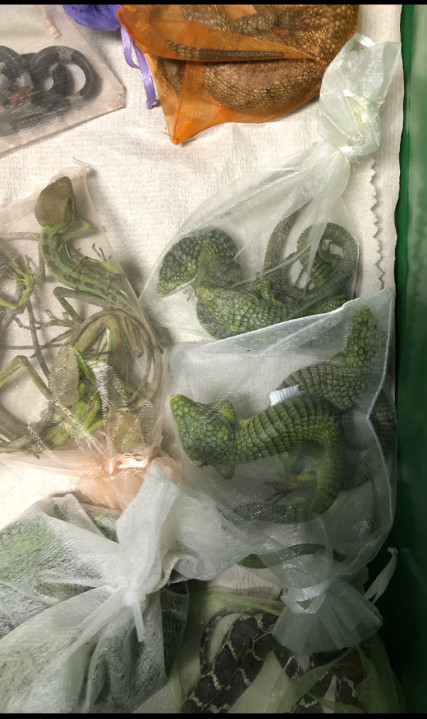An Oxnard man was charged Thursday after allegedly illegally importing more than 1,700 reptiles into the United States, including 60 found hidden in his clothes last month at the country’s border with Mexico.
Jose Manuel Perez, a.k.a. “Julio Rodriguez,” 30, was charged in a superseding indictment with one count of conspiracy, nine counts of smuggling goods into the United States and two counts of wildlife trafficking, the U.S. Attorney’s Office for the Central District of California said in a news release.

Perez is expected to be arraigned on Monday in U.S. District Court in Los Angeles.
His 25-year-old sister, Stephany Perez, is also charged in the indictment with conspiracy and will be directed to appear for an arraignment in the coming weeks, according to the U.S. Attorney’s Office.
The superseding indictment returned Thursday adds allegations to an indictment originally filed on Feb. 24.
The new allegations include 14 overt acts in the conspiracy charge, including some accusing Jose Perez of crossing into the U.S. from Mexico by car at the San Ysidro Port of Entry on Feb. 25 with approximately 60 reptiles – including dozens of lizards and four snakes – concealed inside his jacket pockets, pants pockets, groin area and pant legs, the news release states.
Perez initially denied to customs officials that he had anything to declare but later told them that “the animals were his pets,” the indictment obtained by the Department of Justice alleges.
From January 2016 to February 2022, the Perez siblings and their co-conspirators used social media to buy and to negotiate the terms of the sale and delivery of wildlife in the U.S., according to the indictment. They allegedly advertised on social media animals smuggled from Mexico into the U.S. for sale, posting photos and video that depicted the animals being collected from the wild.

The animals – which included Yucatan box turtles, Mexican box turtles, baby crocodiles and Mexican beaded lizards – allegedly were imported into the country from Mexico and Hong Kong without obtaining permits required by an international treaty known as the Convention on the International Trade of Endangered Species of Wild Fauna and Flora (CITES), the U.S. Attorney’s Office said.
For the animals allegedly smuggled from Mexico, co-conspirators would retrieve the wildlife from Cuidad Juarez International Airport in Mexico and eventually ship the animals by car to El Paso, Texas, the news release says.
Perez paid his co-conspirators a “crossing fee” for each border crossing – the amount of which depended on the number of animals transported, the size of the package and the risk of being detected by authorities.
On other occasions, Perez and a co-conspirator traveled to Mexico to purchase additional live animals that had been taken from the wild so that the animals could be smuggled into the U.S., according to the indictment.
Once the animals were shipped to the U.S., they were allegedly transported to Perez’s then-residence in Missouri. But after he moved to California, the wildlife was shipped to his residence in Ventura County.
Stephany Perez allegedly assisted in the illegal wildlife smuggling business, particularly during two extended periods when her brother was incarcerated in the U.S., the DOJ said.
Jose Perez has been in federal custody since his arrest on Feb. 25.
If convicted of all charges, the defendants would face a statutory maximum sentence of five years in federal prison for the conspiracy charge. Jose Perez would face a statutory maximum sentence of 20 years in prison for each smuggling count and five years in prison for each wildlife trafficking count.
The United States Fish and Wildlife Service investigated the matter with assistance from the U.S. Attorney’s Office for the Southern District of California, U.S. Customs and Border Protection and Homeland Security Investigations.












